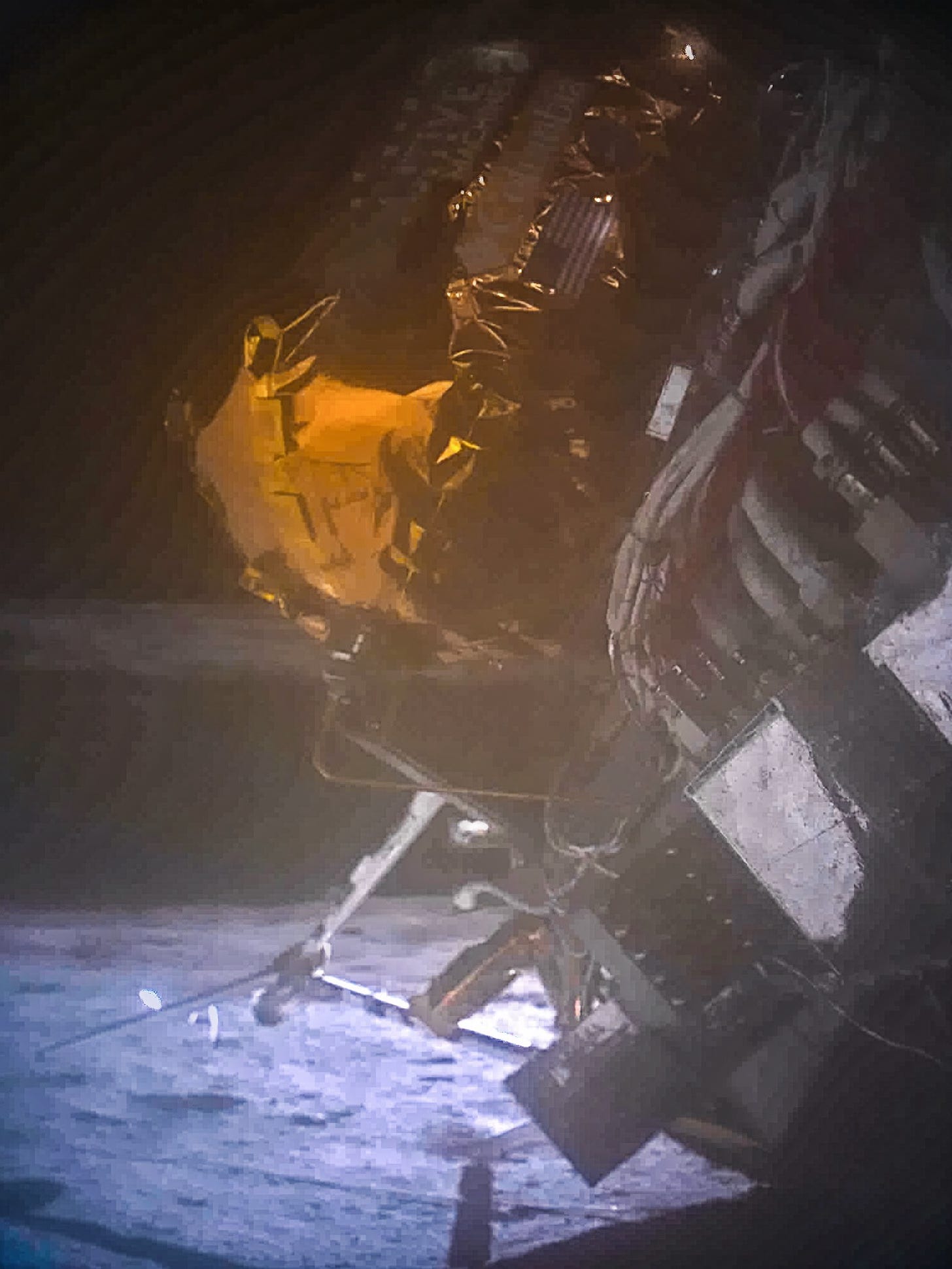WR 19: Space (the final frontier) & customer service (the first frontier)
Weekly Reckoning for the week of 4/3/24
Welcome back to the Ethical Reckoner. In this Weekly Reckoning, we cover some legal tech news (the OpenAI lawsuit and automated voter challenges in Georgia). Then, two nascent stories showing two sides of the AI coin: worker displacement versus educational empowerment. And after that, examining the trend of privatizing space development. Because space!
This edition of the WR is brought to you by… the canals of Amsterdam. And the apple pie of Amsterdam.
The Reckonnaisance
Elon Musk sues OpenAI, alleging breach of non-profit charter
Nutshell: Elon Musk is suing OpenAI, which he co-founded and invested $44 million in, alleging they breached their non-profit charter by pursuing profit rather than the “benefit of humanity.”
More: The filing is rather florid—my favorite part is the claim that CEO Sam Altman and co-founder Greg Brockman “set the Founding Agreement aflame”—but the case boils down to Musk asserting that OpenAI promised to be open-source and work for the benefit of humanity, but that in not releasing its models and pursuing profitable ventures like usage fees and its Microsoft partnership, it has breached its Founding Agreement. Musk seeks “damages in an amount that is presently unknown” and for the court to force OpenAI to respect its charter.
Why you should care: Legal consensus seems to be that Musk doesn’t have much of a case, but if this case moves forward, it could make a court legislate what artificial general intelligence (AGI) is. OpenAI’s mission is to develop AGI, which no one can agree on a specific definition for but can be thought of as AI that can do any cognitive task at least as well as a human. In the case, Musk alleges that ChatGPT is at least nascent AGI. A court legislating this would create some standard, but also a lot of controversy. And, in the seemingly unlikely event that Musk wins his case, it would absolutely upend the OpenAI’s operations and potentially force them to open-source all their research, which would cause huge safety concerns.
![A screenshot of the top of the lawsuit. Text: SUPERIOR COURT OF CALIFORNIA IN AND FOR THE COUNTY OF SAN FRANCISCO ELON MUSK, an individual, Plaintiff, vs. SAMUEL ALTMAN, an individual, GREGORY BROCKMAN, an individual, OPENAI, INC., a corporation, OPENAI, L.P., a limited partnership, OPENAI, L.L.C., a limited liability company, OPENAI GP, L.L.C., a limited liability company, OPENAI OPCO, LLC, a limited liability company, OPENAI GLOBAL, LLC, a limited liability company, OAI CORPORATION, LLC, a limited liability company, OPENAI HOLDINGS, LLC, a limited liability company, and DOES 1 through 100, inclusive, Defendants. Case No.: [UNLIMITED JURISDICTION] COMPLAINT FOR (1) BREACH OF CONTRACT, (2) PROMISSORY ESTOPPEL, (3) BREACH OF FIDUCIARY DUTY, (4) UNFAIR COMPETITION UNDER CAL. BUS. & PROF. CODE §§ 17200 ET SEQ., AND (5) ACCOUNTING DEMAND FOR JURY TRIAL A screenshot of the top of the lawsuit. Text: SUPERIOR COURT OF CALIFORNIA IN AND FOR THE COUNTY OF SAN FRANCISCO ELON MUSK, an individual, Plaintiff, vs. SAMUEL ALTMAN, an individual, GREGORY BROCKMAN, an individual, OPENAI, INC., a corporation, OPENAI, L.P., a limited partnership, OPENAI, L.L.C., a limited liability company, OPENAI GP, L.L.C., a limited liability company, OPENAI OPCO, LLC, a limited liability company, OPENAI GLOBAL, LLC, a limited liability company, OAI CORPORATION, LLC, a limited liability company, OPENAI HOLDINGS, LLC, a limited liability company, and DOES 1 through 100, inclusive, Defendants. Case No.: [UNLIMITED JURISDICTION] COMPLAINT FOR (1) BREACH OF CONTRACT, (2) PROMISSORY ESTOPPEL, (3) BREACH OF FIDUCIARY DUTY, (4) UNFAIR COMPETITION UNDER CAL. BUS. & PROF. CODE §§ 17200 ET SEQ., AND (5) ACCOUNTING DEMAND FOR JURY TRIAL](https://substackcdn.com/image/fetch/w_1456,c_limit,f_auto,q_auto:good,fl_progressive:steep/https%3A%2F%2Fsubstack-post-media.s3.amazonaws.com%2Fpublic%2Fimages%2Fb32f0a27-b705-4bc2-96e9-af2259048be8_1238x844.png)
Voter registration challenge tool sowing chaos in Georgia
More: Georgia state law allows residents to challenge voter registrations in their county if there’s an issue with a registration, like a misspelled name or the person is deceased. If the challenge is successful, the person is removed from the voter rolls and has to re-register. A company, EagleAI, is streamlining this process through a tool that combines public and purchased data (but not actual AI) to allow anyone to investigate potential errors and file challenges en masse with just a few clicks. EagleAI has ties to election deniers and has been operating largely in secret, using in-county proxy filers to skirt the residency requirement, which apparently violates state law, but no one has stopped them yet. They’re targeting swing counties in Georgia and trying to overwhelm them with requests, then pitching themselves as a solution to take over the local voter challenging system. Thankfully, it doesn’t seem like any election boards have taken them up on it.
Why you should care: In an election that’s going to be tight, every vote matters, and these are dirty tactics to try and disenfranchise voters—EagleAI has been called “a new antidemocracy tool”. Hopefully, the Georgia board of elections cracks down on this, but it could open up a concerning new front to keep people from voting.
AI starting to replace customer service agents
Nutshell: Buy-now, pay-later service Klarna reported that its OpenAI-powered AI customer service agent took over 2/3 of its customer service chats last month.
More: Klarna says that customer queries are resolved faster and better than with human agents. It’s available in 23 markets and 35 languages, and they say it does the equivalent work of 700 full-time agents. Klarna’s customer service is contracted out to large third parties, so they say they aren’t directly displacing human workers because they can be reassigned to other companies, but clearly if everyone starts doing this, those companies will need fewer workers.
Why you should care: Having spent an enormous time in chats with PayPal customer service over the past several weeks, I would love easier problem resolution. However, as Klarna acknowledges, introducing AI into this requires “considerate, informed and steady stewardship” to prevent disruption. What their stewardship will look like isn’t clear, but upskilling workers at risk of replacement could be a good first step. However, companies also have to be careful—Air Canada’s chatbot gave a customer the wrong information about refunds, but a court forced Air Canada to honor the bot’s promises.

AI is helping kids learn local languages in Mali
Nutshell: The Malian education ministry is using generative AI and Google Translate to create books in Bambara, a local language.
More: In 2023, Mali changed its national language from French to thirteen local languages. These languages are low-resource languages, presenting challenges for education: there are simply fewer books and learning materials in Bambara than in French. Now, a government-backed initiative is using ChatGPT to generate children’s stories, Google Translate to translate them into Bambara (since ChatGPT doesn’t work in Bambara), and then AI image generator Playground to illustrate them. Government officials correct the translations and make sure that the pictures are appropriate. Officials hope that learning in their mother tongue will help keep them in school (40-60% of Malian kids drop out of school in the first six years), but older kids fear that learning in a local language might limit opportunities outside of Mali.
Why you should care: This is a great example of the good side of AI being practically applied, but even it isn’t without its ethical challenges. Given the mixed quality of AI prose, I have to wonder about the implications of teaching a generation of kids with it. Bambara is spoken by enough people that officials can correct any translation errors, but for AI preservation projects of less-used languages like the indigenous languages of Brazil, it seems possible that the heavier reliance on machines will create “AI dialects.” Also, officials have to deal with the biases of image generators, reporting that Playground often creates hypersexualized and stereotypical images of African people. The question of what languages kids should learn goes beyond technology, but if this can help young kids learn better and stay in school, it will give them more opportunities, even if they end up having to learn French later on.
Extra Reckoning
There’s been a lot of AI chat around here recently, but tech is about more than AI. For instance: space! I have an endless fascination for space, and this year there have been three attempted landings on the moon: Japan’s SLIM, the US’s Peregrine Mission One, and the US’s IM-1 Odysseus. They've been a mixed bag in terms of mission success. SLIM landed extremely precisely (even though one of its landers gave out), but landed almost upside-down and has thus had trouble generating power with its solar panels. Despite this, it was able to send some photos, and it unexpectedly survived lunar night and may be able to continue its work. Peregrine was a different story. It launched successfully, but it experienced a propellant leak en route to the moon and was directed into the Earth’s atmosphere for a controlled burn-up. Odysseus did better, landing slightly harder than planned and breaking a leg, but successfully returning data from five NASA instruments on board. It’s fulfilled its mission and is currently sleeping through the lunar night, but there are hopes that it will wake up after.
Note that even though Odysseus is an American launch, it wasn’t solely a NASA mission. It’s part of the NASA Commercial Lunar Payload Services (CLPS) program, which contracts with private companies to send missions to the moon. NASA is already contracting with private companies like SpaceX for rockets—Odysseus launched on a SpaceX Falcon 9 and Peregrine on a United Launch Alliance Vulcan Centaur—but contracting with them for landers is new. The space race was government-funded and government-led, but now space is increasingly privatized. While government privatization isn’t always a great thing, it might actually be ok here. NASA’s goal with CLPS is to increase competition and drive down the cost of getting things to the moon. NASA is known for being thorough, which produces good spacecraft, but at a cost; its upcoming VIPER mission is estimated to cost $433 million (which is cheap when lunar landers have historically ran between $500 million and $1 billion). By comparison, the Peregrine contract was $108 million, and Odysseus $118 million. NASA has a reputation for building incredibly resilient spacecraft—the Mars rovers, all of which lasted well beyond their planned lifetimes, are great examples—but in moon missions, it only has a 67.27% success rate, and this isn’t just because of the failures of the early space race. NASA has had three moon launches in the 2020s, and only one succeeded. Based on its first two launches, the CLPS has a 50% success rate, so even if NASA launches were 100% successful (which they aren’t), cutting costs by 3/4 more than makes up for the variable success rate.
NASA does have a better record for crewed missions (Challenger and Columbia being the unfortunate exceptions), and when it comes to returning people to the moon, there’s zero room for error, which is probably why NASA is relying on its own Orion spacecraft and launching system for its upcoming Artemis missions. But even that will rely on private companies for support missions and to move astronauts between the orbiter and the moon (which has precedent since NASA uses SpaceX to carry astronauts to the ISS). Still, as we look to returning people to the moon and landing humans on Mars, this may be a good combination of public and private investment to maximize chances of success. And this is a global trend, meaning that we may see even more international space action, especially as China and India’s space programs grow.
Of course, the privatization of the space industry carries a host of problems, including carbon emissions, space junk, light pollution, regulatory challenges, and the weird billionaire bro dynamic between Jeff Bezos and Elon Musk. I try not to let my blind enthusiasm for space exploration distract from these.1 But. No one has walked on the moon in over fifty years, and I want my generation to have its Apollo—or, rather, Artemis—moment, whatever it takes.
I Reckon…
that the Fediverse isn’t decentralized because it relies on domain registrars just like crypto relies on exchanges.
Although according to my cohortmate Giovanni Tricco, who studies space law, we only have more to get excited about as AI and other advanced technologies push the boundaries of what’s possible in space (and don’t worry about HAL-9000).
Thumbnail image is a DALL-E 3-remixed version of the above lunar landscape.





